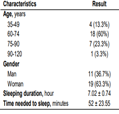Acoustic music therapy on improving cognitive function and sleep quality in elderly dementia patients

Downloads
Background: Acoustic music therapy has been shown to have an impact on reducing anxiety and stress, but not specifically on various stages of dementia and sleep quality in the elderly. This research could explore how acoustic music therapy can provide similar benefits in elderly patients with dementia, where sleep and quality of life problems are often primary concerns.
Objective: To determine the effect of acoustic music therapy on improving cognitive function and sleep quality in elderly dementia patients.
Method: A pre-experimental design employing a one-group pretest-posttest without a control group was utilized. The sampling method employed was purposive sampling, involving 30 selected respondents. The paired sample t-test was then applied for the statistical analysis.
Results: The average dementia score among the elderly increased by 4.36 points (16.17 ± 5.53 to 20.53 ± 4.14) after the intervention. Similarly, the average score for sleep disorders decreased by -0.4 points (7.07 ± 3.11 to 6.67 ± 1.92). The statistical analysis indicated a significant influence of acoustic music on dementia disorders in elderly individuals with sleep disorders (p<0.0001). However, acoustic music did not affect sleep disorders in the elderly (p>0.05).
Conclusion: Acoustic music therapy benefits the elderly, particularly in managing dementia and sleep disorders. These findings emphasize the potential of music therapy as a valuable non-pharmacological alternative in the overall care of the elderly.
Authors retain copyright and grant the journal right of first publication with the work simultaneously licensed under a Creative Commons Attribution-NonCommercial 4.0 International License that allows others to share the work with an acknowledgement of the work's authorship and initial publication in this journal.
Authors are able to enter into separate, additional contractual arrangements for the non-exclusive distribution of the journal's published version of the work (e.g., post it to an institutional repository or publish it in a book), with an acknowledgement of its initial publication in this journal.
Authors are permitted and encouraged to post their work online (e.g., in institutional repositories or on their website) prior to and during the submission process, as it can lead to productive exchanges, as well as earlier and greater citation of published work (See The Effect of Open Access).

This work is licensed under a Creative Commons Attribution-NonCommercial 4.0 International License.











